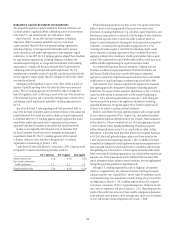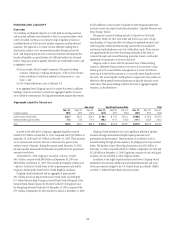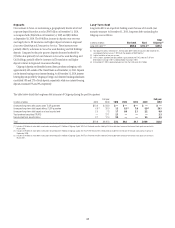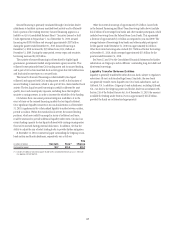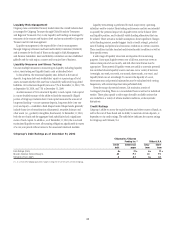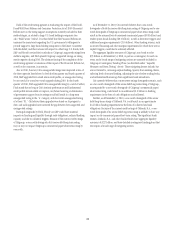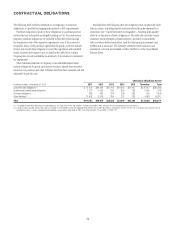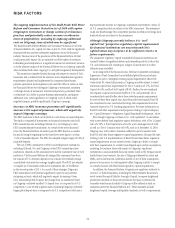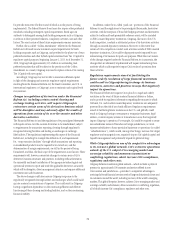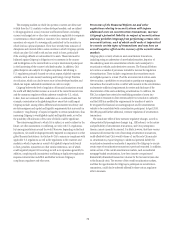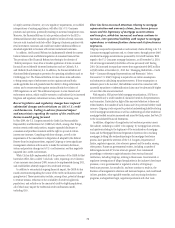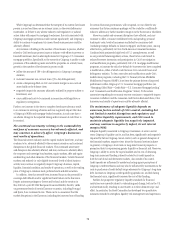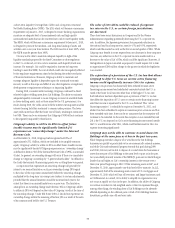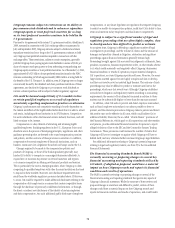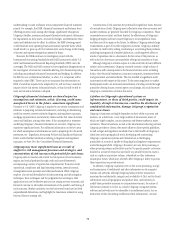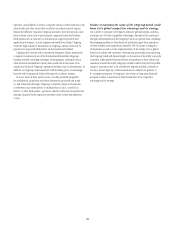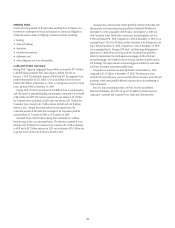Citibank 2010 Annual Report Download - page 75
Download and view the complete annual report
Please find page 75 of the 2010 Citibank annual report below. You can navigate through the pages in the report by either clicking on the pages listed below, or by using the keyword search tool below to find specific information within the annual report.73
The emerging markets in which Citi operates or invests are often more
volatile than the U.S. markets or other developed markets, and are subject
to changing political, social, economic and financial factors, including
currency exchange laws or other laws or restrictions applicable to companies
or investments in those markets or countries. Citi’s extensive global
operations also expose it to sovereign risk, particularly in the countries in
which Citi has a physical presence. There have recently been instances of
disruptions and internal strife in some countries in which Citigroup operates
which can place Citi’s staff at risk and can result in losses, particularly
if the sovereign defaults or nationalizes Citi’s assets. These risks must be
balanced against Citigroup’s obligations to its customers in the country
and its obligations to the central bank as a major international participant
in the functioning of the country’s wholesale market. In addition, Citi’s
global footprint also subjects it to higher compliance risk relating to
U.S. regulations primarily focused on various aspects of global corporate
activities, such as anti-money laundering and Foreign Corrupt Practices
Act violations, which can also be more acute in less developed markets and
which can require substantial investments in order to comply.
Citigroup believes the level of regulation of financial institutions around
the world will likely further increase as a result of the recent financial crisis
and the numerous regulatory efforts underway outside the U.S., which,
to date, have not necessarily been undertaken on a coordinated basis. For
example, uncertainties in the global regulatory arena that could impact
Citigroup include, among others, different and inconsistent insolvency and
resolution regimes and capital and liquidity requirements that may result in
mandatory “ring-fencing” of capital or liquidity in certain jurisdictions, thus
increasing Citigroup’s overall global capital and liquidity needs, as well as
the possibility of bank taxes or fees, some of which could be significant.
The extensive regulations to which Citi is subject, or may be subject in the
future, are often inconsistent or conflicting, not only with U.S. regulations,
but among jurisdictions around the world. Moreover, depending on the final
regulations, Citi could be disproportionately impacted in comparison to other
global financial institutions. Any failure by Citi to remain in compliance with
applicable U.S. regulations as well as the regulations in the countries and
markets in which it operates as a result of its global footprint could result
in fines, penalties, injunctions or other similar restrictions, any of which
could negatively impact Citi’s earnings as well as its reputation generally. In
addition, complying with inconsistent, conflicting or duplicative regulations
requires extensive time and effort and further increases Citigroup’s
compliance, regulatory and other costs.
Provisions of the Financial Reform Act and other
regulations relating to securitizations will impose
additional costs on securitization transactions, increase
Citigroup’s potential liability in respect of securitizations
and may prohibit Citigroup from performing certain roles
in securitizations, each of which could make it impractical
to execute certain types of transactions and may have an
overall negative effect on the recovery of the securitization
markets.
Citigroup plays a variety of roles in asset securitization transactions,
including acting as underwriter of asset-backed securities, depositor of
the underlying assets into securitization vehicles and counterparty to
securitization vehicles under derivative contracts. The Financial Reform
Act contains a number of provisions intended to increase the regulation
of securitizations. These include a requirement that securitizers retain
un-hedged exposure to at least 5% of the economic risk of certain assets
they securitize, a prohibition on securitization participants engaging in
transactions that would involve a conflict with investors in the securitization
and extensive additional requirements for review and disclosure of the
characteristics of the assets underlying securitizations. In addition, the
FDIC has adopted new criteria for establishing transfers of assets into
securitization transactions from entities subject to its resolution authority,
and the FASB has modified the requirements for transfers of assets to
be recognized for financial accounting purposes and for securitization
vehicles to be consolidated with a securitization participant. In April 2010,
the SEC proposed further additional, extensive regulation of securitization
transactions.
The cumulative effect of these extensive regulatory changes, as well as
other potential future regulatory changes (e.g., GSE reform), on the nature
and profitability of securitization transactions, and Citi’s participation
therein, cannot currently be assessed. It is likely, however, that these various
measures will increase the costs of executing securitization transactions,
could effectively limit Citi’s overall volume of, and the role Citi may play
in, securitizations, expose Citigroup to additional potential liability for
securitization transactions and make it impractical for Citigroup to execute
certain types of securitization transactions it previously executed. In addition,
certain sectors of the overall securitization markets, such as residential
mortgage-backed securitizations, have been inactive or experienced
dramatically diminished transaction volumes for the last several years due
to the financial crisis. The recovery of the overall securitization markets,
and thus the opportunities for Citigroup to participate in securitization
transactions, could also be adversely affected by these various regulatory
reform measures.


